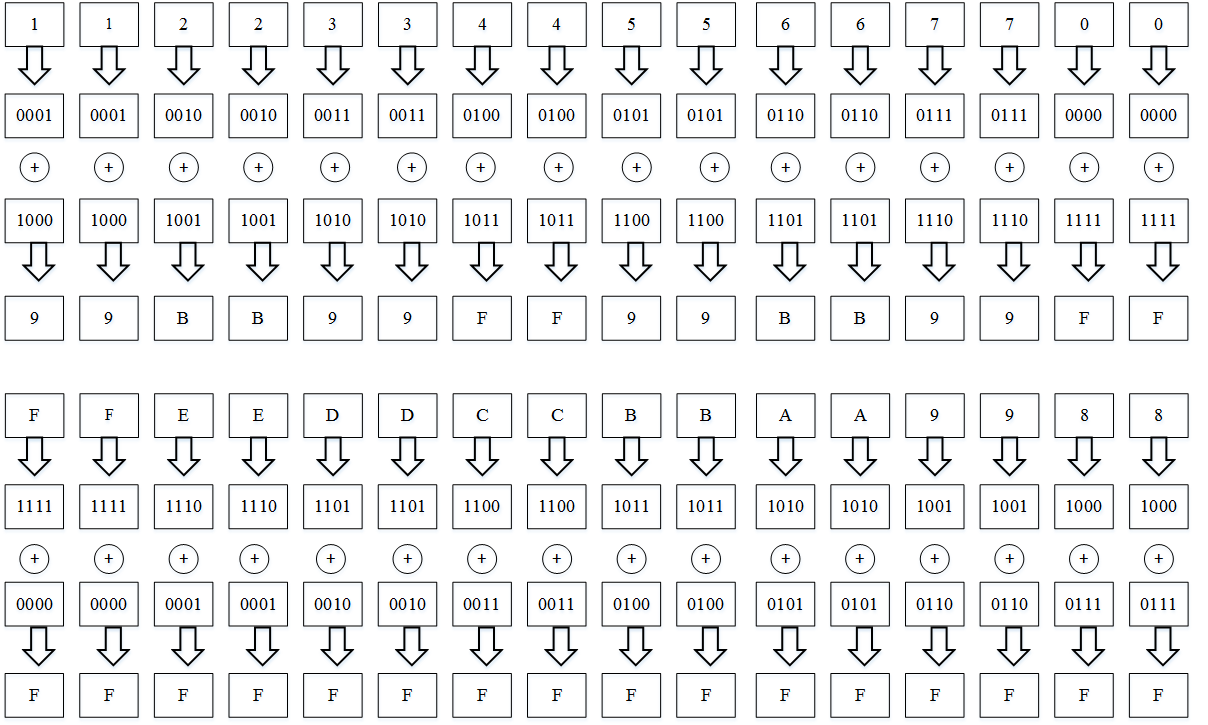Step-by-step work GOST R 34.12-2015 in ECB mode
Grasshopper in ECB mode
 Not so long ago, an article appeared devoted to a new standard for block encryption - GOST R 34.12-2015. In which all the innovations of this algorithm are described in detail. In this article I will try to explain the step-by-step action of the algorithm in the simple replacement mode, so that users can appreciate the advantages of the national standard even more clearly. In the process of scanning round keys and in the encryption mode, the same transformations are used, so we will not make this question separately. For greater understanding, each transformation will explain part of the code implementing the standard in C ++.
Not so long ago, an article appeared devoted to a new standard for block encryption - GOST R 34.12-2015. In which all the innovations of this algorithm are described in detail. In this article I will try to explain the step-by-step action of the algorithm in the simple replacement mode, so that users can appreciate the advantages of the national standard even more clearly. In the process of scanning round keys and in the encryption mode, the same transformations are used, so we will not make this question separately. For greater understanding, each transformation will explain part of the code implementing the standard in C ++.So let's get started.
We have a clear text a = 1122334455667700ffeeddccbbaa9988 and a master key key = 8899aabbccddeeff0011223344556677fedcba98765432100123456789abcdef .
The first transformation is the bitwise addition modulo 2 of the plaintext and the first round key, that is:
')

Transformation X: a-plaintext, b-round key (coincides with the highest part of the master key), outdata-result of the conversion.
int funcX(unsigned char* a, unsigned char* b, unsigned char* outdata) { for (int i = 0; i < 16; ++i) { outdata[i] = a[i] ^ b[i]; } return -1; } The result of the first conversion is a vector of 128 bits in length; it is equal to 99BB99FF99BB99FFFFFFFFFFFFFFFFFF . The second transformation of the algorithm is a nonlinear bijective transformation of the vector obtained after the first operation using the substitution block. It works as follows:
The 128-bit vector after addition modulo two is converted to decimal byte-by-byte, thereby determining the position of the byte in the lookup table (S-block), then the number in decimal form is read from this position and converted back to hexadecimal. For example, the hexadecimal number 99 corresponds to the decimal 153. The element with the number 153 in the lookup table has the value 232, which corresponds to the hexadecimal E8.
For our source data, this conversion will look like this:

S conversion (indata-result of X-transformation, outdata-result of S-conversion):
void funcS(unsigned char* indata, unsigned char* outdata) { for (int i = 0; i < 16; ++i) { outdata[i] = kPi[indata[i]]; } } The kPi array is the same S-block.
The next step in encryption is a linear transformation performed using a linear shift register with feedback. It works as follows: first, the result of the S-conversion is read byte-by-byte, then each read byte is multiplied by 256 (this is necessary to calculate the position of the number in the table table.h with all possible multiplication results in the GF field (2 ^ n) according to GOST). The number is read from the position, the coefficient 148, 32, 133, 16, 194, 192, 1, 251, 1, 192, 194, 16, 133, 32, 148, 1 is added to it , depending on the iteration number, as happens with the following bytes. The bytes are added together modulo two and all 128 bits (the result of the S-conversion) are shifted towards the low-order bit, and the resulting number is written in hexadecimal to the place of the read byte. The register is shifted and overwritten 16 times.

R conversion (indata-result of S-conversion, outdata-result of a single register shift):
int funcR(unsigned char * indata, unsigned char *outdata) { unsigned long sum = 0; for (int i = 0; i < 16; ++i) { sum ^= multTable[indata[i] * 256 + kB[i]]; } outdata[0] = sum; memcpy(outdata + 1, indata, 15); return -1; } Directly L-transform:
int funcL(unsigned char* indata, unsigned char* outdata) { unsigned char tmp[16]; int i = 0; memcpy(tmp, indata, 16); for (i = 0; i < 16; ++i) { funcR(tmp, outdata); memcpy(tmp, outdata, 16); } return 0; } The result of the L-transform will be the next 128-bit vector E297B686E355B0A1CF4A2F9249140830 This is the result of the first round of the algorithm, the next 8 rounds will be performed in the same way, the results of their work can be found in the standard description. The final 10 round includes only the X-transformation of the results of 9 rounds and the key of the 10 round.
For those who are too lazy to dig in the source code for the implementation of the Grasshopper
Nonlinear bijective transformation
Inverse nonlinear bijective transformation of the set of binary vectors:
Multiplication coefficients in the transformation l:
Transform X:
S conversion:
R conversion:
Inverse transform s:
Inverse transform L:
Inverse transform R:
Function generation iterative keys:
Function development of iterative constants:
A slightly modified procedure for obtaining round keys:
static const unsigned char kPi[256] = { 252, 238, 221, 17, 207, 110, 49, 22, 251, 196, 250, 218, 35, 197, 4, 77, 233, 119, 240, 219, 147, 46, 153, 186, 23, 54, 241, 187, 20, 205, 95, 193, 249, 24, 101, 90, 226, 92, 239, 33, 129, 28, 60, 66, 139, 1, 142, 79, 5, 132, 2, 174, 227, 106, 143, 160, 6, 11, 237, 152, 127, 212, 211, 31, 235, 52, 44, 81, 234, 200, 72, 171, 242, 42, 104, 162, 253, 58, 206, 204, 181, 112, 14, 86, 8, 12, 118, 18, 191, 114, 19, 71, 156, 183, 93, 135, 21, 161, 150, 41, 16, 123, 154, 199, 243, 145, 120, 111, 157, 158, 178, 177, 50, 117, 25, 61, 255, 53, 138, 126, 109, 84, 198, 128, 195, 189, 13, 87, 223, 245, 36, 169, 62, 168, 67, 201, 215, 121, 214, 246, 124, 34, 185, 3, 224, 15, 236, 222, 122, 148, 176, 188, 220, 232, 40, 80, 78, 51, 10, 74, 167, 151, 96, 115, 30, 0, 98, 68, 26, 184, 56, 130, 100, 159, 38, 65, 173, 69, 70, 146, 39, 94, 85, 47, 140, 163, 165, 125, 105, 213, 149, 59, 7, 88, 179, 64, 134, 172, 29, 247, 48, 55, 107, 228, 136, 217, 231, 137, 225, 27, 131, 73, 76, 63, 248, 254, 141, 83, 170, 144, 202, 216, 133, 97, 32, 113, 103, 164, 45, 43, 9, 91, 203, 155, 37, 208, 190, 229, 108, 82, 89, 166, 116, 210, 230, 244, 180, 192, 209, 102, 175, 194, 57, 75, 99, 182}; Inverse nonlinear bijective transformation of the set of binary vectors:
static const unsigned char kReversePi[256] = { 0xa5, 0x2d, 0x32, 0x8f, 0x0e, 0x30, 0x38, 0xc0, 0x54, 0xe6, 0x9e, 0x39, 0x55, 0x7e, 0x52, 0x91, 0x64, 0x03, 0x57, 0x5a, 0x1c, 0x60, 0x07, 0x18, 0x21, 0x72, 0xa8, 0xd1, 0x29, 0xc6, 0xa4, 0x3f, 0xe0, 0x27, 0x8d, 0x0c, 0x82, 0xea, 0xae, 0xb4, 0x9a, 0x63, 0x49, 0xe5, 0x42, 0xe4, 0x15, 0xb7, 0xc8, 0x06, 0x70, 0x9d, 0x41, 0x75, 0x19, 0xc9, 0xaa, 0xfc, 0x4d, 0xbf, 0x2a, 0x73, 0x84, 0xd5, 0xc3, 0xaf, 0x2b, 0x86, 0xa7, 0xb1, 0xb2, 0x5b, 0x46, 0xd3, 0x9f, 0xfd, 0xd4, 0x0f, 0x9c, 0x2f, 0x9b, 0x43, 0xef, 0xd9, 0x79, 0xb6, 0x53, 0x7f, 0xc1, 0xf0, 0x23, 0xe7, 0x25, 0x5e, 0xb5, 0x1e, 0xa2, 0xdf, 0xa6, 0xfe, 0xac, 0x22, 0xf9, 0xe2, 0x4a, 0xbc, 0x35, 0xca, 0xee, 0x78, 0x05, 0x6b, 0x51, 0xe1, 0x59, 0xa3, 0xf2, 0x71, 0x56, 0x11, 0x6a, 0x89, 0x94, 0x65, 0x8c, 0xbb, 0x77, 0x3c, 0x7b, 0x28, 0xab, 0xd2, 0x31, 0xde, 0xc4, 0x5f, 0xcc, 0xcf, 0x76, 0x2c, 0xb8, 0xd8, 0x2e, 0x36, 0xdb, 0x69, 0xb3, 0x14, 0x95, 0xbe, 0x62, 0xa1, 0x3b, 0x16, 0x66, 0xe9, 0x5c, 0x6c, 0x6d, 0xad, 0x37, 0x61, 0x4b, 0xb9, 0xe3, 0xba, 0xf1, 0xa0, 0x85, 0x83, 0xda, 0x47, 0xc5, 0xb0, 0x33, 0xfa, 0x96, 0x6f, 0x6e, 0xc2, 0xf6, 0x50, 0xff, 0x5d, 0xa9, 0x8e, 0x17, 0x1b, 0x97, 0x7d, 0xec, 0x58, 0xf7, 0x1f, 0xfb, 0x7c, 0x09, 0x0d, 0x7a, 0x67, 0x45, 0x87, 0xdc, 0xe8, 0x4f, 0x1d, 0x4e, 0x04, 0xeb, 0xf8, 0xf3, 0x3e, 0x3d, 0xbd, 0x8a, 0x88, 0xdd, 0xcd, 0x0b, 0x13, 0x98, 0x02, 0x93, 0x80, 0x90, 0xd0, 0x24, 0x34, 0xcb, 0xed, 0xf4, 0xce, 0x99, 0x10, 0x44, 0x40, 0x92, 0x3a, 0x01, 0x26, 0x12, 0x1a, 0x48, 0x68, 0xf5, 0x81, 0x8b, 0xc7, 0xd6, 0x20, 0x0a, 0x08, 0x00, 0x4c, 0xd7, 0x74}; Multiplication coefficients in the transformation l:
static const unsigned char kB[16] = { 148, 32, 133, 16, 194, 192, 1, 251, 1, 192, 194, 16, 133, 32, 148, 1}; Transform X:
int funcX(unsigned char* a, unsigned char* b, unsigned char* outdata) { for(int i = 0; i < 16; ++i) { outdata[i] = a[i] ^ b[i]; } return -1; } S conversion:
void funcS(unsigned char* indata, unsigned char* outdata){ for(int i = 0; i < 16; ++i) { outdata[i] = kPi[indata[i]]; } } L conversion int funcL(unsigned char* indata, unsigned char* outdata) { unsigned char tmp[16]; int i = 0; memcpy(tmp, indata, 16); for(i = 0; i < 16; ++i) { funcR(tmp, outdata); memcpy(tmp, outdata, 16); } return 0; } R conversion:
int funcR(unsigned char * indata , unsigned char *outdata ){ unsigned long sum=0; for(int i = 0; i < 16; ++i) { sum ^= multTable[indata[i]*256 + kB[i]]; } outdata[0] = sum; memcpy(outdata+1, indata, 15); return -1; } Inverse transform s:
int funcReverseS(unsigned char* indata, unsigned char* outdata) { unsigned int i; for(i = 0; i < 16; ++i) { outdata[i] = kReversePi[indata[i]]; } return 0; } Inverse transform L:
int funcReverseL(unsigned char* indata, unsigned char* outdata) { unsigned char tmp[16]; unsigned int i; memcpy(tmp, indata, 16); for(i = 0; i < 16; ++i) { funcReverseR(tmp, outdata); memcpy(tmp, outdata, 16); } return 0; } Inverse transform R:
int funcReverseR(unsigned char* indata, unsigned char* outdata) { unsigned char tmp[16] = {0}; unsigned char sum = 0; unsigned int i; memcpy(tmp, indata+1, 15); tmp[15] = indata[0]; for(i = 0; i < 16; ++i) { sum ^= multTable[tmp[i]*256 + kB[i]]; } memcpy(outdata, tmp, 15); outdata[15] = sum; return 0; } Function generation iterative keys:
int funcF(unsigned char* inputKey, unsigned char* inputKeySecond, unsigned char* iterationConst, unsigned char* outputKey, unsigned char* outputKeySecond) { unsigned char temp1[16] = {0}; unsigned char temp2[16] = {0}; funcLSX(inputKey, iterationConst, temp1); funcX(temp1, inputKeySecond, temp2); memcpy(outputKeySecond, inputKey, 16); memcpy(outputKey, temp2, 16); return 0; } Function development of iterative constants:
int funcC(unsigned char number, unsigned char* output) { unsigned char tempI[16] = {0}; tempI[15] = number; funcL(tempI, output); return 0; } A slightly modified procedure for obtaining round keys:
int ExpandKey(unsigned char* masterKey, unsigned char mass[8][16] ) { unsigned char C[16] = {0}; unsigned char temp1[16] = {0}; unsigned char temp2[16] = {0}; unsigned char j, i; unsigned char keys[16]; int g=0; memcpy(keys, masterKey, 16); memcpy(keys + 16, masterKey + 16, 16); memcpy(temp1, keys,16); memcpy(temp1+16, keys+16,16); for(j = 0; j < 4; ++j) { for( i = 1; i <8; ++i ) { funcC(j*8+i, C); funcF(temp1, temp2, C, temp1, temp2); } funcC(j*8+8, C); funcF(temp1, temp2, C, temp1, temp2); // ! memcpy(keys , temp1, 16); memcpy(keys + 16, temp2, 16); memcpy(mass[g],temp1,16); g++; memcpy(mass[g],temp2,16); g++; } return 0; } Source: https://habr.com/ru/post/269601/
All Articles